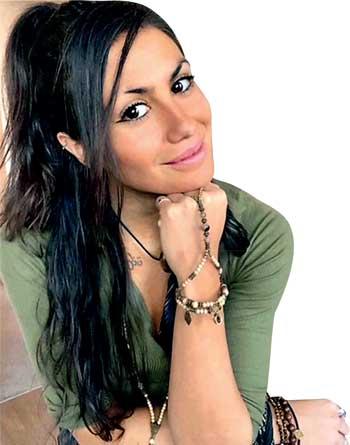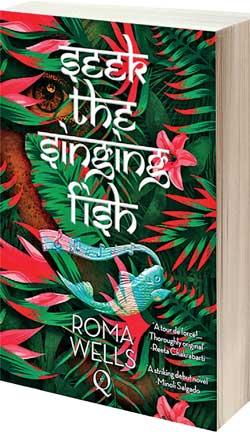Reply To:
Name - Reply Comment
My deep adoration for the natural world, sparked early on in witnessing the captivation of my Sri Lankan mum (an animal health inspector) and grandad (who rescued and rehabilitated sloth bears and monkeys in Sri Lanka) has always felt like a superpower
 Hailing from London, UK, Roma Wells is not your average author. With a background in International Relations from Cambridge University, she brings a unique perspective to her writing and endeavours. But Roma’s talents extend far beyond the realm of academia. She’s a true adventurer at heart, exploring the world and sharing her passion with audiences worldwide. Roma is also the CEO of Curious Fox, a sustainable travel company that gives back to wildlife conservation and local communities. She is also a Nature Presenter and a voice artiste.
Hailing from London, UK, Roma Wells is not your average author. With a background in International Relations from Cambridge University, she brings a unique perspective to her writing and endeavours. But Roma’s talents extend far beyond the realm of academia. She’s a true adventurer at heart, exploring the world and sharing her passion with audiences worldwide. Roma is also the CEO of Curious Fox, a sustainable travel company that gives back to wildlife conservation and local communities. She is also a Nature Presenter and a voice artiste.
Q: What inspired you to become a writer?
 I’ve always had a passion for wordcraft for as long as I can remember. I loved to write short stories to entertain my Sri Lankan grandpa as he gardened and his reactions to my stories spurred my creativity like wildfire. Writing has always felt like a form of home and a kind of magic. To distil and pour the jungle of my mind to the page and have it move people, whip and stir their emotions, feels like the closest thing to magic
I’ve always had a passion for wordcraft for as long as I can remember. I loved to write short stories to entertain my Sri Lankan grandpa as he gardened and his reactions to my stories spurred my creativity like wildfire. Writing has always felt like a form of home and a kind of magic. To distil and pour the jungle of my mind to the page and have it move people, whip and stir their emotions, feels like the closest thing to magic
in this world. In writing, I carve a home in sorcery and bear witness to the beautiful chaos between my temples.
Q: Can you tell us about your journey to becoming a published author?
I started out working in a range of newsrooms as a teenager (Time Out London, The Daily Telegraph and The Sunday Times) and landed my own magazine column at age 16. After studying International Relations, I went on to work in Foreign Affairs Journalism,eventually running the International Development news portfolio at the 10 Downing Street Press Office and the Asia News Desk over at the Department for International Development. Though I enjoyed the adrenaline rush of the newsroom, my real passion was always building worlds and creative writing so I began to write my debut novel, Seek the Singing Fish, through my nights after work. I wanted to craft a story full of colour and emotion that celebrated the majestic nature of my Sri Lankan heritage while also shedding light on harrowing issues I covered in my news career, such as modern slavery and sectarian conflict. My hope was to show how the splendour of nature and the barbarism of warfare can serve to enhance each other’s pigments. Epoque Press, a literary fiction publisher, loved the script and thus my journey to becoming a published author began!
Q: Describe your novel in one sentence as if you were telling a friend?
Seek the Singing Fish is a story about hope in the heart of darkness, exploring how the natural world can provide a sanctuary and refuge in the face of intense trauma and the horrors of modern slavery and warfare.
 Q: How would you describe your writing style or voice?
Q: How would you describe your writing style or voice?
It’s a lyrical and deeply sensory writing style which aims to immerse all the reader’s senses in the narrative. I also like to engage with the reader as a friend joining me on a journey hence why I give the reader a name early on in the story to add some personal flare.
Q: Where do you draw inspiration for your stories or characters?
The natural world has always been my biggest source of inspiration. Nature feels like a refuge to me, a secret kingdom hidden in plain sight, a treasure trove which nourishes you the further you sink into its bounty. My deep adoration for the natural world, sparked early on in witnessing the captivation of my Sri Lankan mum (an animal health inspector) and grandad (who rescued and rehabilitated sloth bears and monkeys in Sri Lanka) has always felt like a superpower. Inhaling the damp earth, tasting the seasons and indulging in wildlife heals and grounds me on a daily basis so I wanted to celebrate the profound power of nature as a sanctuary through my writing.
Q: What are you currently reading?
Rewild Yourself by Simon Barnes. It’s a hopeful little guide book offering a chocolate box of simple ‘spells’ to reconnect with the magic of nature bustling all around us. From anchoring your eyesight to a buddleia bush to indulge in the ballet of butterflies to simply slowing down and sitting still in waterproof trousers and letting the natural world drench your senses with its treasures. The quote ‘There’s no such thing as bad weather, only inappropriate clothing’ has really stuck with me here in rainy London.
Q: Who is your favourite author and why do you admire them?
Jhumpa Lahiri, Khaled Hosseini and Arundhati Roy. I love the way you can taste, smell and feel the storyscapes they conjure. They butter you into the minds of their characters, plunge you into blistering foreign terrain and marinate you into the folds of their narrative.
Q: What fictional character resembles you the most?
I would say Raya from the series ‘Raya and the Last Dragon’ resonates with me. She’s an adventurous, wildlife-loving tomboy who heads out on a mission to save majestic creatures, which is exactly what I like to think I’m doing with my life!
Q: Name a book you have recently enjoyed reading?
Songbirds by Christy Lefteri. It’s about a Sri Lankan domestic worker, Nisha, in Cyprus who goes missing, told through eyes of her employer and her love interest. I find it fascinating how the absence of Nisha’s voice imbues her actions and words with more meaning. It feels symbolic of how so many women in domestic jobs have their voice, respect and pride stripped away and are spoken for by others. I’ve just started but I’m enjoying it so far.
Q: Tell us about a book you enjoyed reading as a child and the effect it had on you?
Jonathon Livingstone’s Seagull. It’s a book that makes you feel like you can fly. It’s about this young seagull who loves to fly, not as means to an end, but as an end in itself, but he’s cast out from the flock for this passion. The descriptions are so liberating, the diving, swirling, plunging aerial acrobats of this bird and I used to love picking up this book before bed and soaring before sleep. It’s also a powerful allegory for the importance of chasing our passions, not following the flock and finding a freedom in what we love to do.
Q: What is your take on self publishing?
I think it’s a great way to get your writing into the world. If you believe in your story and think it can inspire and ignite something in others, getting it out there is the most important thing. It’s easy to get despondent with rejections from traditional publishers but no one should doubt their identity as an artist just because they aren’t picked by traditional gatekeepers. Be bold, carve your own path and get your writing into the world!
Q: Can you share any insights or teasers about your upcoming projects or works in progress?
I’ve been working on some fun nature presenting projects, one with the BBC focused on encouraging kids to appreciate wildlife and become eco-heroes, finding more sustainable ways to live that help protect our beautiful planet. I’m also working on my next novel, Animlis.